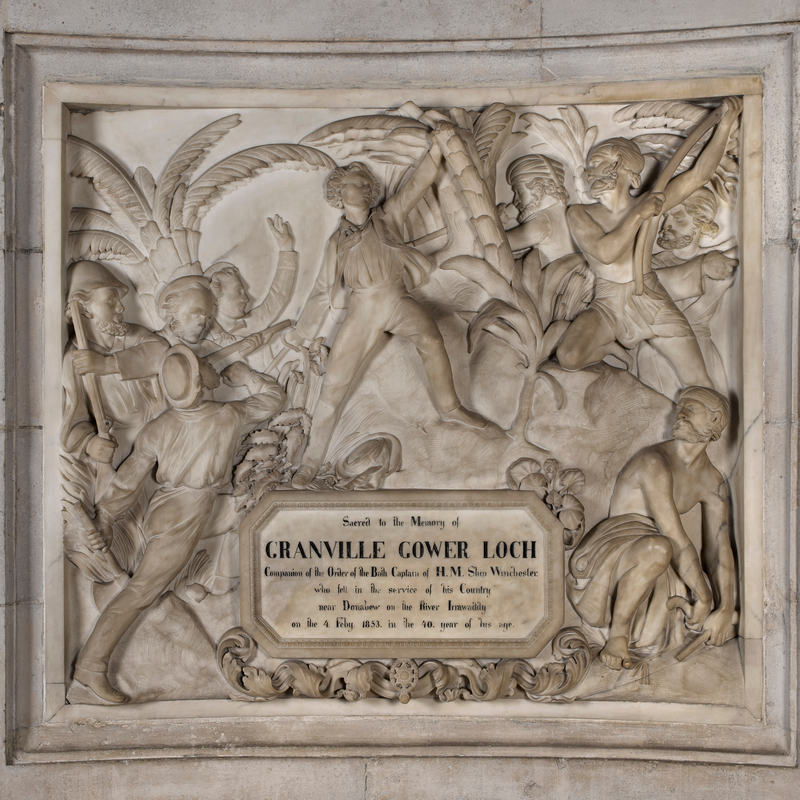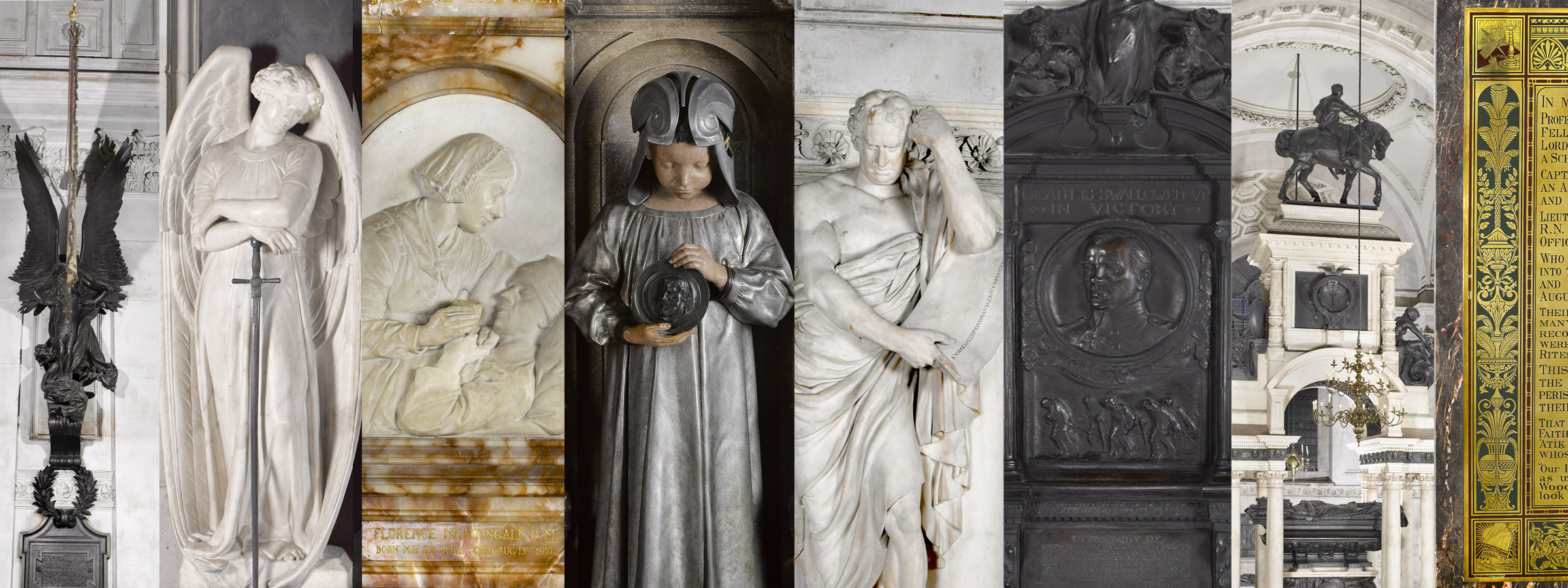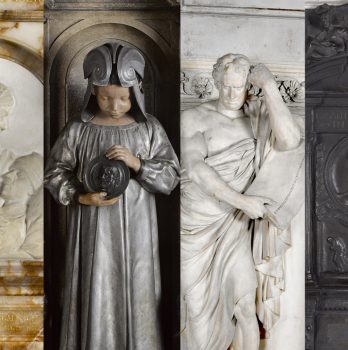‘Why Handsome Single Guys Die in Burma?’: Writer and activist Rogelio Braga’s Response to the Monument to Captain Granville Gower Loch (1813–1853), by Carlo Marochetti, 1853


‘Why Handsome Single Guys Die in Burma?’
By Rogelio Braga
The original script (published below) is a dramatic monologue and a work of fiction. As demonstrated in its inaugural presentation here, it can also be performed by more than one actor. Please note, the script is © Rogelio Braga, 2022 and may not be reproduced or performed without their permission.
Credits
Performed by: Aldrin Bula, Istifen Dagang Kanal
Directed and edited by Gio Potes
Special thanks to: Bahaghari U.K., Anf mga Baklang Kanal
Further reading:
The film highlights the following books:
- The Anarchy: The Relentless Rise of the East India Company by William Dalrymple (Bloomsbury, 2020)
- The British in India: Three Centuries of Ambition and Experience by David Gilmour (Penguin, 2019)
About Rogelio Braga
Rogelio Braga is an exiled playwright, novelist, essayist, publisher, and human rights activist from the Philippines. They had published two novels, a collection of short stories, and a book of plays before leaving the archipelago in 2018.
Braga was a fellow of the Asian Cultural Council in New York for research on political resistance in theatre and performance across Southeast Asia in 2016. Their works have been read and performed at the Cultural Center of the Philippines in Manila; the Mercury Theatre in Colchester; the National Theatre Studio; and the Soho Theatre. They were recently awarded a grant by the Writers’ Guild of Great Britain in their inaugural New Play Commission Scheme for Miss Philippines (New Earth Theatre), their first play written entirely in the English language . Their book of stories Is There Rush Hour in a Third World Country? (translated by Kristine Ong Muslim) will be released in December 2022 by the South London radical press, The 87Press.
Braga currently lives and writes in London as a refugee under the Convention.
Visit Rogelio Braga’s website and find them on Twitter and Instagram.
About Gio Potes (Director)
Gio is a filmmaker, dramaturg, researcher, writer and occasional actor from the University of the Philippines Diliman. A graduate of the UP Film Institute, he is active in campus theater particularly with The UP Repertory Company and the UP Dulaang Laboratoryo, and for his short films that focus on narratives about the LGBTQIA++ community, namely: Mark and Lenny (2017), Sunugin ang Aparador (2018), Dating Nick (2019) and Julie (2020).
Alternating with his own creative work, Gio conducts workshops on various aspects of theatre, and also seminars and training on gender equality and SOGIE. He is currently working in the University of the Philippines Diliman Gender Office as its SOGIE & Training Officer and is pursuing his Master’s degree at the Department of Women and Development Studies in UP Diliman. He is also currently the Artistic Director of the UP Repertory Company.
About Istifen Dagang Kanal (Actor)
Istifen Dagang Kanal is a nonbinary performance maker and storyteller from the Philippines; their work usually revolves around queer narratives and experiences. Istefen’s work is typically seen on unconventional spaces and the streets of Manila. They are a member of Concerned Artist of the Philippines (CAP), and as an extension of queerness and service for the community, they are also a Member of HIV and AIDS Support House (HASH) as CBS Motivator giving HIV testing and counseling to communities deprived of basic sexual health.
Istifen believes that stories from communities should be heard and performed in and for those communities.
About Aldrin Bula (Actor)
Aldrin Bula is a queer artist, activist, and trade unionist based in the Philippines. Her primary works are in music for political theatre as well as in queer lived experiences. She is currently the Vice President of the LGBTQ+ organization UPLB Babaylan and has been the Production Manager for Teatro Umalohokan, a community theatre organization at the University of the Philippines Los Baños, and a member of an artistic national democratic mass organization, Panday Sining UP Los Baños. As a queer person in a cisheteronormative society, she believes that art must be transformative and telling of the lived experiences of her community in the quest for gender equality.
ANG MGA BAKLANG KANAL is a queer solidarity collective composed of different creatives & cultural workers that contribute to the ongoing discourse and struggle of the Filipino LGBTQIA+ community through performance and artmaking in the streets, and within different fields and venues
BAHAGHARI UK is a progressive organisation of LGBTQ+ Filipino migrants in the United Kingdom. Find Bahaghari UK on Twitter, Instagram and Facebook.
About the Monument
Granville Gower Loch (1813–1853), a Scotsman, joined the Royal Navy at the age of 13. Throughout his naval career, he took part in campaigns across the British Empire, including China and the West Indies. In 1852, he was in command of H.M.S. Winchester near the mouth of the Irrawaddy River in Burma, during the Second Anglo-Burmese War, with the purpose of keeping the riverhead clear of opposing Burmese forces.
In early 1853, Loch led a naval and army combined force inland against a Burmese chief Nya Myat Toon, and sculptor Carlo Marochetti‘s monument to Loch depicts the moment before Loch’s death in the ensuing battle. Marochetti suggests the jungle setting with the background of palm trees and the lotus flower ‘growing’ prominently from the frame around the inscription. The monument shows Loch standing proud at the centre of the scene, as a hero leading his men, against the barefoot, bearded enemy, who, like the British sailors are bearded, but who are represented wearing only a loin cloth and with bare feet. Their weapons at various stages of readiness foreshadow Loch;s imminent death.
Script: ‘Why Handsome Single Guys Die in Burma?’ by Rogelio Braga
The entire scene is a monologue of MISS MALICIOUS transforming from a regular transgender woman into fabulous drag queen. The performance follows the form of a typical beauty vlogging in social media. MISS MALICIOUS narrates the life story of Captain Granville Gower Loch as she applies make-up, wig, then to a complete transformation with costume and a short dance number.
The entire piece could be performed online or on stage.
MISS MALICIOUS enters the stage, sits at the vanity table, turns on the ring light and the camera:
MISS MALICIOUS:
Hello there again, my precious little ones! Welcome to my channel where only beautiful creatures, great and small, visit Miss Malicious. Saying Mabuhay! and hello to all my fans, friends, frenemies, lovers, chasers out there and to those who are here just to see how beautiful I am today. But before we start, please click the subscribe button below. Click, click, click! There you go! For this episode of ‘Why Handsome Guys Die Single in Burma’…No you’re wrong sisters, we are not going to talk about Kyaw Min Yu, Phyo Zeya Thaw, Hla Myo Aung, and Aung Thura Zaw the four activists and artists executed by the murderous junta recently. Just so you know, our wild boys, the Tatmadaw, is busy killing people in Burma recently.
For this episode of ‘Why Handsome Guys Die Single in Burma’ we are going back in the 19th century Burma! Yes, you heard it right, bitches! 19th century – the century when your sugar daddies giving you mullah every week was born (laughs).
Just a disclaimer before you cancel me: I’ve never been to Burma and never lived during the 19th century. I hope we’re clear on these, okay?
Our handsome guy who died single in Burma for this episode is none other than the mysterious bachelor-guy-next-door named Granville Gower Loch! Yes, girl, ‘lock’, not ‘lotch’. Pronounce it like ‘lock’ like the ‘Loch-ness monster’, remember? You probably got the first hint on the background of our handsome guy who died in Burma in the 19th century. Yes, he was Scottish.
Miss Malicious have questions about our dead single guy here. Why Granville was single? Like how did he die? Why in Burma? Who killed him? Where are his remains now? How about his family? Were they abusive? So many questions but we’ll try to answer these on this episode. Shall we?
Some basic facts about our handsome single dead guy Granville Gower Loch. Chav guy was born on the 28th of February 1813 and reliable sources tell me that he was born from his mother. He died on 6th of February 1853 barely forty years old and reliable sources again told me too that his heart just stopped beating. The moral of the story here bitches: don’t wait for your forty to live your life to the fullest; if you want to slap your enemy tomorrow, slap her yesterday as you might end up dead on your thirty-ninth.
For a starter, Granville was a very lucky man. Very, very lucky man. Like the usual stories of successful cis white men born with a silver spoon in their mouths here in Britain. Success in life was easy for him, served in a silver platter…or was it in a china? Anyway, Granville traveled the world, like literally traveled the world that either they didn’t have border controls that time or simply Britain owned the world. Our guy here ‘been to South America, China, Southeast Asia…name it bitches, this is the kind of white guy you swipe right on Tinder because bio says he’s been to blah blah number of countries and counting. It’s worth noting too that our boy here was from a wealthy and powerful family from Drylaw, northwest of Edinburgh. Yes, bitch you pronounce it as E-DIN-BRAH not E-DIN-BORGE, Patel-not-Priti might send you back to the boat.
I am not being malicious here but I’d like to ask: Who killed him? And why was he in Burma of all places?
Accounts said that he was shot in Donabew, near the Irrawady River and died two days later. But who killed him? Why? why? And why?
We’ll try to find Graville’s killer and the motives behind the killing on this episode, just be patient with me. For us to identify the killer and the motives, we have to go back 253 years earlier in London. Yes, London. During reign of the never been fucked, never been kissed Queen Lizzie the First when the bitch gave a charter for the creation of the East India Company in 1600.
Now you’ll ask Miss Malicious: What’s a company created 253 years earlier got to do with the death of our Scottish boy here?
Just trust my process, bitches, we are on our way there. Let’s start with the East India Company, shall we? Okay. Good. The keyword here, sisters is here: India. Yes, India. My best friend never been fucked, never been kissed Queen Lizzie the First created the company so that these group of English merchants could trade and do some business in India. At first, it was just business, factories, trading. But after several decades since the first EIC ship to land in India in 1608, it had become a powerful company, so powerful that it built its own huge military, warships, and that it could actually wage war in another country – which actually, it did.
I am not being malicious here and I am not trying to be rude but I’ll say it otherwise: EIC made England and later Britain, wealthy through the massive colonial plunder of India for almost two and half centuries. Poor India baby, plundered. My ex-boyfriend from uni William Dalrymple wrote about the history of EIC in his book The Anarchy: The Relentless Rise of the East India Company. You know the word ‘loot’? According to William it was one of the first Hindustani word that entered the English language that literally translates as yes, you heard it right, ‘plunder’.
Okay: so, EIC made England and Britain rich. And with this comes the rise of the rich, you know ‘the’ real rich that you could still see them now on the telly and smell their perfume anywhere in this country. In Britain, you do not become rich by working hard or be clever enough to become rich or by robbing the Bank of England. You have to be born rich from a rich vagina. Or in the case of Granville’s family: you have to be in India.
Don’t worry. We are almost there. Just be patient.
Now the EIC had created rich families. Another ex-boyfriend of mine David Gilmore wrote about how the rich got their wealth from plundering India’s resources for almost three hundred years. My David’s book is called ‘The British in India‘. David said that businessmen, aristocrats, adventurers, soldiers, even ordinary bureaucrats whenever they lost their fortune like in gambling, mismanagement, or simply could no longer keep up their lifestyle, for three centuries they look up to India as a way they could rebuild their family’s fortune. It’s like the modern version of migrants who would come to Western countries to seek for better life, work and money, and bring those back home in the form of remittance. You know bitch, I don’t really believe that there is such a thing as ‘economic migrants’ because migrants are just simply, migrants. Full stop. But if you will push the concept of the ‘economic migrants’, the British from the three hundred years or so were the first economic migrants in India brining back to Britain not remittances but plundered wealth.
Okay, where was I? Oh, we’re here on my eyebrows. Now, David, my clever ex-boyfriend, wrote in his book about the clan of our dead single guy Granville. Don’t worry we are on our way there! Patience is a virtue. Here’s the tea: Granville’s family and clan? They lost their wealth. Boom. Gone. Their family’s wealth ended with Granville’s grandfather: George Loch of Drylaw.
George died poor in 1877. Not poor ‘poor’ like you poor moving from Morrison’s to Iceland a week before your next paycheck. He was bankrupt. He sold his ancestors’ estate near Edinburgh and died before his forties. The reason for this was because the family had accounted so much debt due of George’s political activities. His eldest son, Granville’s father, followed his father’s path: he, too, entered politics. I am not being malicious here but you’ll are familiar to that story when the younger generation of an old rich family started to return to the glory of the generations before them and then was forced by their elders to work hard to find ways to bring the glory back to the family? I am not being malicious here again but that’s the story of the Lochs. The younger generations of Lochs resurrected the family’s glory. And they were successful. But imagine the pressure, the toxic family members you blocked on Facebook, telling you to do this and that, abandon your dreams and follow this path. Imagine the kind of childhood Granville had?
How the later Lochs did it? Here’s my ex-boyfriend David Gilmore again enumerating how the Lochs successfully resurrected the family’s glory: sons of George became MPs, there was an admiral, became civil servants and director of, listen to this: East India Company. Remember that if you are just a son of poor grocer in Peckham high street, bitch you cannot enter and get a job inside East India Company, unless you have a backer inside, usually your family members or relatives, or friends of friends of your rich parents. It’s like the toxic but exclusive in-breeding gay sauna at 12 noon where all of you are bottoms and you have no other choice but to swallow each other’s poison just to get by. Thirty of George’s male descendants built their careers in India, in the army, doctors, traders, engineers. If the internet was invented in the late 18th century, I bet one of the Lochs was an influencer. Imagine the force, the pressure of bringing the glory of the family back and you have no other ways to do that but go up, up, acquire more wealth, and go to India.
The young Granville then had decided to pursue a peculiar path to help regain the family’s glory: military. I am not being malicious here by saying that he was probably abused and pressured at an early age to help resurrect the family’s glory… But at the age of 13, Granville entered the navy. He was 19 when passed the exam. 19 was the year I opened my first Grinder account. A year later at 20, he was promoted to a lieutenant, at the age of 24 he was already commanding a ship. Jesus at 24? I was caught by the police cruising at Hampstead Heath when I was 24! At 28 he went to China and published a book in his early 30s. He was 39 years old when commanded the frigate HMS Winchester during the Second Burmese War. He was almost 40 when he was killed.
At 40, mind you, I could be a retired queen and a happy housewife of a rich Tory.
It must be very, very traumatic childhood for the young Granville. He never even had the time to look for a girlfriend (or a boyfriend for that matter) and was left to wank his white, wealthy, and Scottish dick up to his death.
Our main character here was only 10 years old when the Burmese Empire attempted to annexed Chittangong by occupying an island owned by the East India Company. This was the start of the First Anglo-Burmese War which of course, Britain won but spent almost between 5 to 13 million pounds. Imagine the business of war was as older than Queen Lizzie the second? Winning the war means Burma, or some parts of it would be under the British rule. For several decades until the Burmese Independence, the country was ruled by Britain through India.
Granville, our boy here, was captain of the navy fighting one of the three Burmese wars. Like seriously? I am not being malicious here: boy, why are you there?
So, this is the story that I gathered on Granville’s last days. During the Second Anglo-Burmese War, he was with the frigate HMS Winchester. The admiral died and we don’t know why maybe he accidentally swallowed a spoon and the commodore was elsewhere and we don’t know where was he, maybe cruising around we don’t know. The task of keeping the Irrawady River clear from the Burmese freedom fighters was left to Granville. But the Burmese, being in Burma, were successful in blocking the river. Granville led the naval and military expedition. You know I am not being malicious here but I think that time he was probably thinking of winning this war and then get a promotion to a higher position and his family to become more wealthy, influential, or powerful. It was the trauma all over again. So, he walked into the Burmese jungle like the superhero he was. Ambushed by the Burmese freedom fighters. Shot in the body. He probably screamed ‘ugh!’, ‘ahhhh!’, ‘ouch!’ we don’t know. Fell on a Burmese soil. He decided not to breath forever two days later.
He was single. I am not being malicious here but he could probably gay, or not even; he might be just happy being single, or ghosted by his dates, traumatised by relationships or worse, an incel. We wouldn’t know.
Jane, the bitch of Winchester once admonished “It is a truth universally acknowledged, that a single man in possession of a good fortune, must be in want of a wife”. No, not our boy here Granville, girl. Not our boy here…
His unmarried remains were buried in Yangon, together with the remains of the officers and men of HMS Winchester. There was a monument of him inside St. Paul’s Cathedral in London because handsome dead single guys who died in someone else’s garden needed a memorial.
So, who killed our chav guy here Captain Granville? Why did he die in Burma?
We are not being malicious here but yes, you are correct. That killed him.
No, no, no. Miss Malicious is saying that the moral of story here is not that if you’re single and handsome stay away from Burma. Not that.
Very good. See you all little ones until the next episode! Bye for now. Mwah!
Miss Malicious dances, now complete with make-up and costume. She exits dancing.
CURTAIN.
© Rogelio Braga, 2022


